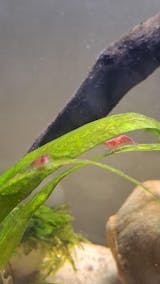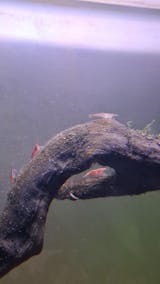Introducing the mesmerizing Blue Cherry Shrimp, a wonderful choice for your aquarium. These delightful shrimp are known for their stunning and vibrant blue coloration, adding a touch of elegance to your underwater world.
Key Features:
- Vibrant blue coloration for a visually appealing appearance.
- Adaptable to various tank conditions, suitable for aquarists of all levels.
- Known for their peaceful nature and captivating presence.
10 Ideal Tank Mates for Blue Cherry Shrimp:
- Neocaridina Shrimp
- Ember Tetra
- Pygmy Corydoras
- Nerite Snail
- Celestial Pearl Danio
- Mystery Snail
- Cherry Barb
- Amano Shrimp
- Crystal Red Shrimp
- Nerite Snail
5 Similar Shrimp Varieties:
Feeding Instructions:
- Ensure a balanced diet with algae wafers and shrimp snow.
- Offer small, frequent meals to ensure timely consumption.
- Include occasional servings of fresh vegetables like zucchini or cucumber.
Tank Setup:
- Utilize a dependable aquarium heater for maintaining stable water temperature (22-24°C).
- Provide suitable aquarium lighting for plant growth and natural behavior.
- Select high-quality aquarium substrate for plant support and aesthetics.
- Include hiding spots and cholla wood for their comfort and breeding.
10 Plants and Moss Compatible with this Shrimp:
- Anubias
- Java Fern
- Amazon Swords
- Java Moss
- Marimo Moss Ball
- Red Root Floaters
- Duckweed
- Hornwort
- Water Wisteria
- Jungle Val
Preferred Water Parameters:
- Temperature: 22-24°C
- pH: 7.0-7.5
- TDS: 150+
Explore our extensive selection of aquarium shrimp at Abquatics. Elevate your shrimp tank with locally bred, high-quality shrimp.
Q: How much is postage cost?
A: All dry goods are $9.95 flat shipping, $13.95 for Plants express postage and live stock are $23 express postage flat. Handling time applies.
Q: Where do we ship ?
A: We ship Australia wide but Live stock are not shipped to WA,NT & Tasmania because of the state law.
Q: Where do we ship from ?
A: We ship from Sydney,
Q: When do we ship ?
A: All dry goods are shipped Monday - Friday. Live Goods are shipped Mon - Wed depending where you are.
Q: Can I Pick Up ?
A: We are not offering any pickup at this stage
Q: Can I return the item back?
A: All dry stock can be returned back. Live goods are not refundable. Shipping cost will be deducted upon return of the item and also customer is responsible to send the item back.
Q: Are pictures of actual item that I will receive ?
A: Most of our dry goods arrive looking 99% the same as pictured. Items sold by weight may vary in appearance. For live plants, fish, and snails, the photos are for reference only, as natural variations in size, color, and shape will occur.
Q: Are plants pest free ?
A: Our plants are kept in tanks with fish, so they may not be completely pest-free.
Q: Are moss pest free ?
A: Our moss are kept in tanks with fish, so they may not be completely pest-free.
Q: Are Tissue Culture plants pest free ?
A: Yes, They are.
We do ship dry goods.
Step 1: Prepare the necessary materials
Clean bucket or container large enough
Airline tubing
Air pump (optional but recommended)
Adjustable valve or knot (to regulate the flow of water) or get a abquatics drip kit
Clean, dechlorinated water (ideally matching the temperature and pH of your tank)
Step 2: Set up the drip acclimation system
Fill a clean bucket or container with the clean, dechlorinated water.
Attach one end of the airline tubing to an air pump (if using) and place the other end inside the bucket. Make sure it reaches the bottom of the container.
Step 3: Start the drip
Open the bag containing the aquatic animals and carefully pour the entire contents into the bucket, including the water from the transport bag.
Start a siphon by sucking on the free end of the airline tubing or use a siphon starter. This will initiate a slow drip of water into the bucket.
Step 4: Adjust the drip rate
Use an adjustable valve or tie a knot in the airline tubing to regulate the drip rate. Aim for approximately 2-4 drips per second.
The slow drip helps gradually mix the water in the bucket with the water from the transport bag, preventing any sudden changes in water parameters.
Step 5: Monitor the process
Keep an eye on the acclimation process and periodically test the water parameters in the bucket using a test kit. This helps ensure a smooth transition.
Depending on the sensitivity of the animals and the water parameters involved, the acclimation process may take anywhere from 30 minutes to a few hours.
Step 6: Adjust water volume if needed
If the water volume in the bucket becomes too high, you can remove some water and continue the drip acclimation process with fresh, dechlorinated water. Be cautious not to remove too much water, as it can lead to sudden changes in water parameters.
Step 7: Transfer the animals to the tank
Once the acclimation process is complete, gently net the aquatic animals from the bucket and transfer them to the tank. Avoid adding the water from the acclimation container to the tank to prevent any potential contamination.
Step 8: Dispose of the acclimation water
After transferring the animals, discard the acclimation water from the bucket. Do not pour it directly into any drains or natural bodies of water.
By following these steps, you can safely and gradually acclimate your shrimp, snails, and fish to their new tank environment after transport. Remember, it's important to monitor the process closely and make adjustments as necessary to ensure a smooth transition for your aquatic pets.








